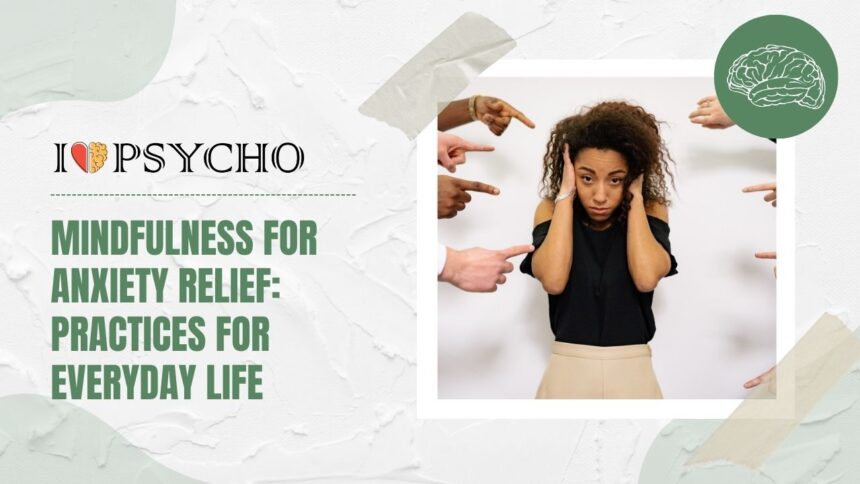Feeling like a hamster on a wheel, constantly racing with worry and stress? You’re not alone. Anxiety can sneak its way into our lives, disrupting our peace of mind and daily routines. But fear not! There’s a powerful tool that can help you reclaim your calm amidst the chaos: mindfulness. Join us on a journey to explore how practicing mindfulness can be your secret weapon in combatting anxiety and embracing serenity in everyday life.
Understanding Anxiety and its Impact on Daily Life
Anxiety is like a persistent cloud looming over our heads, casting shadows of doubt and unease in our minds. It can manifest as racing thoughts, restlessness, or even physical symptoms like a pounding heart or sweaty palms. The impact of anxiety on daily life can be profound, affecting relationships, work productivity, and overall well-being.
Simple tasks may suddenly feel overwhelming, social interactions may trigger apprehension, and the constant worry can drain us mentally and emotionally. Anxiety doesn’t discriminate; it can strike anyone at any time. Recognizing its presence is the first step towards regaining control and finding inner peace amidst the storm.
What is Mindfulness?
Mindfulness is a powerful practice that involves being fully present and engaged in the moment. It’s about paying attention to your thoughts, feelings, and surroundings without judgment. By cultivating mindfulness, you can develop a greater sense of self-awareness and emotional regulation.
At its core, mindfulness encourages you to observe your thoughts as they come and go, like clouds passing through the sky. It teaches you to tune into your body’s sensations and be more attuned to the present moment rather than getting lost in worries about the past or future.
By practicing mindfulness regularly, you can learn to respond to life’s challenges with clarity and calmness. It allows you to step back from automatic reactions and choose how you want to engage with difficult situations. Mindfulness is not just a trend; it’s a way of living that can enhance your overall well-being.
The Link Between Mindfulness and Anxiety
When it comes to anxiety, our minds can often spiral into a whirlwind of worries and negative thoughts. The link between mindfulness and anxiety lies in the power of being present in the moment. Mindfulness allows us to observe our thoughts without judgment, helping us break free from the cycle of anxious thinking.
By practicing mindfulness, we can cultivate a greater sense of self-awareness and emotional regulation. This awareness enables us to recognize when anxiety is creeping in and empowers us to respond with calmness and clarity. Instead of getting caught up in catastrophic thinking, mindfulness offers a pathway towards acceptance and peace.
Engaging in mindful practices such as meditation, deep breathing exercises, or simply focusing on the sensations around us can help anchor us in the present moment. Through this practice, we can gradually rewire our brains to become less reactive to stressors and more resilient in facing life’s challenges.
Mindful Breathing Techniques
When anxiety clouds your mind and overwhelms your thoughts, taking a moment to focus on your breath can bring you back to the present moment. Mindful breathing techniques are simple yet powerful tools that can help calm the storm within.
Start by finding a comfortable position, whether sitting or lying down. Close your eyes if it helps you center yourself. Take a deep breath in through your nose, feeling the air fill up your lungs. Then slowly exhale through your mouth, releasing any tension you may be holding onto.
As you continue this pattern of deep breathing, notice how each inhale and exhale flows naturally without force. Pay attention to the sensation of air entering and leaving your body. Allow yourself to let go of any racing thoughts and simply be in tune with the rhythm of your breath.
If distractions arise, gently guide your focus back to the present moment by returning to observing your inhalations and exhalations. Remember that mindful breathing is always available to you as a grounding practice whenever anxiety creeps in.
Body Scan Meditation for Anxiety
Body scan meditation is a powerful mindfulness practice that can help alleviate anxiety by bringing awareness to different parts of the body. By systematically focusing on each area, you can release tension and stress held within your physical being. Start by finding a quiet space where you can lie down comfortably and close your eyes.
Begin the body scan by directing your attention to your toes, slowly moving up through each part of the body—ankles, calves, knees, thighs—acknowledging any sensations without judgment. Notice areas of tightness or discomfort and breathe into them with gentle acceptance. As you progress upwards to the torso, shoulders, arms, neck, and head, let go of any pent-up emotions or worries stored in these regions.
The key is to stay present in the moment as you scan through every inch of your body. Embrace a sense of calmness and relaxation with each breath you take. By practicing this meditation regularly, you can cultivate a deeper connection between mind and body while easing anxiety symptoms effectively.
Mindful Activities for Stress Management
Engaging in mindful activities can be a powerful tool for managing stress and anxiety. One effective practice is mindful walking, where you focus on each step you take, the sensation of your feet connecting with the ground. This simple act can help to ground you in the present moment and alleviate feelings of overwhelm.
Another beneficial activity is mindful eating, where you savor each bite of your food, paying attention to textures, flavors, and sensations. By fully immersing yourself in the experience of eating, you can cultivate a greater sense of awareness and reduce stress levels.
Engaging in creative pursuits like painting or crafting can also be incredibly therapeutic. The act of creating something with your hands allows you to channel your emotions into a tangible form while also fostering mindfulness and relaxation.
By incorporating these mindful activities into your daily routine, you can proactively manage stress and promote overall well-being.
Incorporating Mindfulness in Daily Activities to Reduce Anxiety
Incorporating mindfulness into your daily activities is a powerful tool to reduce anxiety. Start your day with intention by setting aside a few minutes for mindful breathing. Focus on the sensation of each breath entering and leaving your body, allowing yourself to be fully present in the moment.
As you go about your tasks, practice mindfulness by bringing awareness to the present moment. Whether you’re eating breakfast, walking to work, or doing chores, pay attention to the sights, sounds, and sensations around you without judgment.
Engage in body scan meditations throughout the day to release tension and stress from different parts of your body. By systematically focusing on each area of your body, you can bring relaxation and ease into areas that hold tension.
Incorporate mindful activities like yoga or tai chi into your routine to promote physical well-being while calming the mind. These practices help cultivate a sense of peace and balance amidst life’s chaos.
By infusing mindfulness into everyday moments, you can shift towards a more grounded and centered way of being that ultimately reduces anxiety levels over time.
Benefits of Maintaining a Mindful Lifestyle
Living a mindful lifestyle can bring about a myriad of benefits that positively impact your overall well-being. When you prioritize mindfulness, you cultivate a greater sense of self-awareness, allowing you to recognize and manage your emotions more effectively.
By embracing mindfulness, you enhance your ability to stay present in the moment, reducing feelings of stress and anxiety that often stem from dwelling on the past or worrying about the future. This heightened awareness empowers you to respond to challenging situations with clarity and composure.
Incorporating mindfulness practices into your daily routine can also improve cognitive function and concentration, enabling you to focus more deeply on tasks at hand. As you develop a regular mindfulness practice, you may notice an increased sense of gratitude for the simple joys in life.
Embracing a mindful lifestyle fosters deeper connections with others as it encourages empathy and compassion towards yourself and those around you. It promotes a sense of inner peace and contentment by fostering acceptance of the present moment without judgment or resistance.
Conclusion: Start Your Journey to a More Mindful Life Today
Start your journey to a more mindful life today. By incorporating mindfulness practices into your daily routine, you can reduce anxiety and stress, improve mental clarity, and enhance overall well-being. Mindfulness is a powerful tool that can help you navigate through the ups and downs of life with greater ease and resilience. Take small steps each day to cultivate mindfulness, whether it’s through mindful breathing exercises, body scan meditations, or engaging in everyday activities with full awareness. Embrace the present moment and let go of worries about the past or future. Your journey towards a more mindful life starts now – embrace it wholeheartedly!









